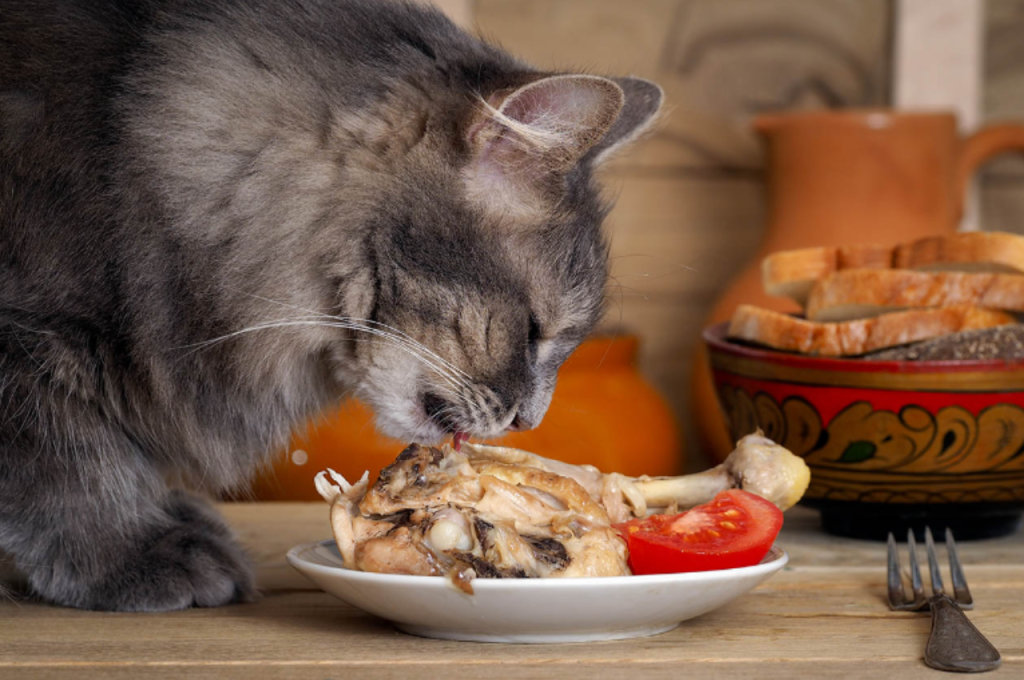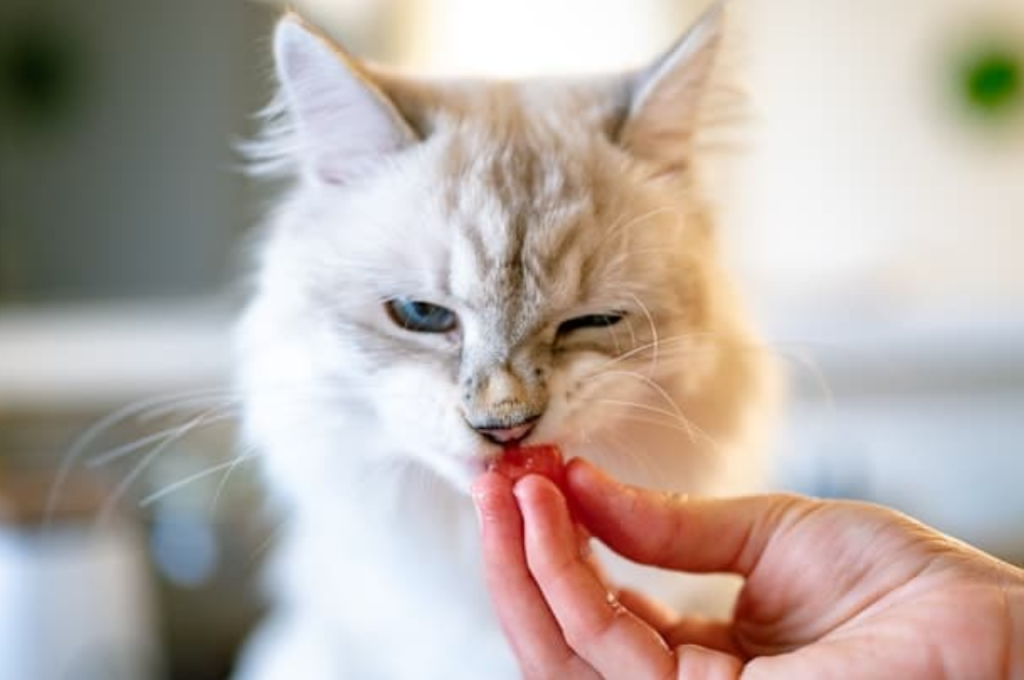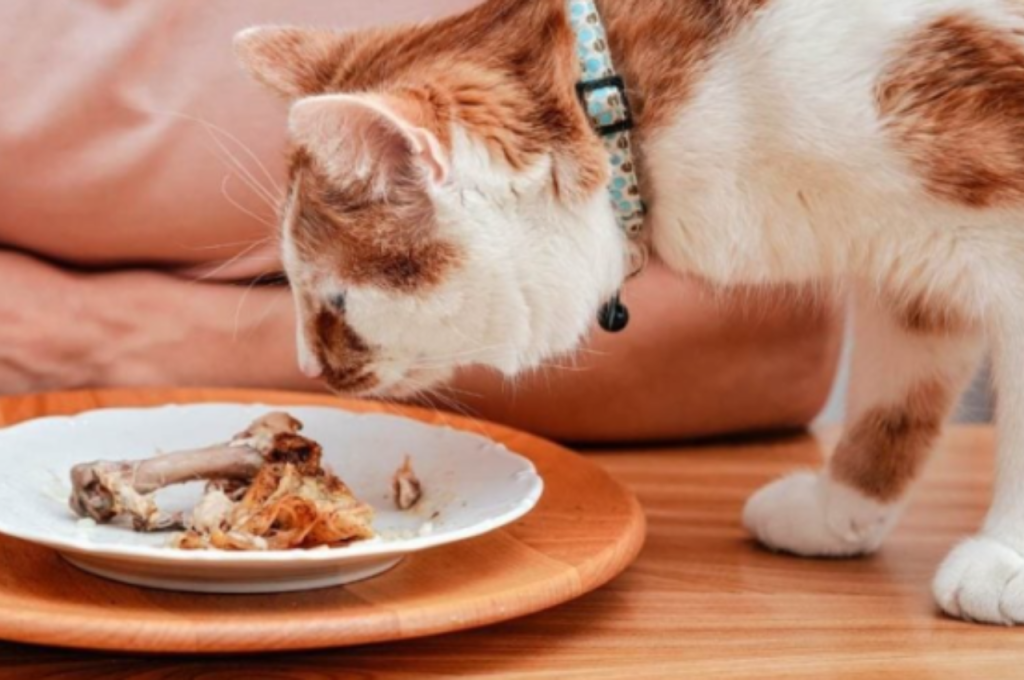Chicken is better for cats due to its high protein content and digestibility compared to salmon. While salmon is a good source of omega-3 fatty acids, chicken is a more balanced diet for felines.
Cats are obligate carnivores, needing meat-based diets rich in protein for optimal health. Chicken provides a complete protein source, and essential amino acids, and is easily digestible for cats. On the other hand, salmon can be fed in moderation but lacks essential nutrients like taurine that cats need.
While salmon can be a healthy addition, chicken remains the superior choice for meeting a cat’s dietary needs and overall well-being.
Chicken As a Protein Source
Chicken serves as a primary protein source for cats, offering essential nutrients vital for their overall health and well-being. Integrating chicken into their diet can help support their muscle development and immune system.

Nutritional Benefits of Chicken
Chicken is rich in amino acids, aiding in muscle development and growth.
- Provides vital nutrients for cats’ skin and coat health.
- Contains Taurine, crucial for feline heart and eye health.
Potential Risks of Chicken Consumption
Ensure chicken is cooked thoroughly to prevent bacterial contamination.
- Excessive consumption may lead to obesity in cats.
- Allergic reactions to chicken protein can occur in some felines.
Salmon As A Protein Source
When it comes to providing essential nutrients to your feline friend, choosing the right source of protein is crucial. Salmon is a popular option, known for its rich omega-3 fatty acids and high-quality protein content. Understanding the nutritional benefits and potential risks of salmon consumption is essential for ensuring the health and well-being of your cat.
Nutritional Benefits of Salmon
Salmon is an excellent protein source for cats, containing all the essential amino acids required for optimal feline nutrition. Additionally, it is rich in omega-3 fatty acids, which contribute to a healthy skin and coat, as well as supporting overall immune system function. The presence of these essential fatty acids also makes salmon a great option for cats with inflammatory conditions or joint issues.
Potential Risks of Salmon Consumption
While salmon offers numerous nutritional benefits, it is important to be aware of potential risks associated with its consumption by cats. One key consideration is the presence of thiaminase, an enzyme in raw fish that can lead to thiamine deficiency in cats if consumed in large quantities. Additionally, there is the risk of exposure to parasites and bacteria, particularly in raw or undercooked salmon. It is important to ensure that any salmon offered to your cat is properly cooked and sourced from reputable suppliers to mitigate these risks.
Comparing Chicken and Salmon
When it comes to providing a balanced and nutritious diet for your beloved feline friend, choosing the right protein source is essential. Among the many options available, chicken and salmon often emerge as popular choices. Let’s take a closer look at these two options and compare their protein content, essential nutrients, and taste preferences for cats.
Protein Content
Protein is a vital component of a cat’s diet, supporting healthy growth, muscle development, and overall well-being. When comparing chicken and salmon, it is important to consider their respective protein content. Both chicken and salmon are excellent sources of high-quality protein, but the exact amount may vary.
In general, chicken contains around 20 grams of protein per 100 grams of meat. This makes it a protein powerhouse for cats, ensuring they receive the essential amino acids they need. On the other hand, salmon boasts a slightly higher protein content, with approximately 22 grams of protein per 100 grams. This extra protein boost can be beneficial for active, energetic cats who require an increased protein intake.
Essential Nutrients
Protein is not the only factor to consider when choosing between chicken and salmon for your cat. Both protein sources offer a variety of essential nutrients that support overall health and well-being.
| Chicken | Salmon |
| Rich in vitamin B6, promoting a healthy nervous system. | Packed with omega-3 fatty acids, benefiting skin and coat health. |
| Contains essential minerals like phosphorus and selenium. | Provides vitamin D, supporting bone strength and immune function. |
| A great source of niacin, aiding digestion and energy production. | Offers a substantial amount of potassium, supporting heart health. |
Taste Preferences
Taste preferences play a crucial role in determining whether your cat will enjoy their meals. Cats are known for their individualistic tastes, and some may have a preference for chicken while others may lean towards salmon.
Chicken tends to have a milder taste that most cats find appealing. Its natural flavor often leads to successful mealtime experiences, ensuring your feline companion enjoys their food while obtaining the necessary nutrients.
Salmon, on the other hand, has a stronger and more distinct taste that might appeal to cats who enjoy fish-based flavors. The aroma and flavor of salmon can entice even the pickiest eaters, making it a popular choice among many cat owners.

Ultimately, the decision between chicken and salmon comes down to your cat’s individual preferences, nutritional needs, and any specific dietary requirements. It is always a good idea to consult with your veterinarian and determine the best protein source for your cat’s health and happiness.
Health Implications of Protein Sources
When choosing between chicken and salmon for your feline friend, it’s crucial to consider the health implications of these protein sources.
Impact On Digestive Health
- Chicken: Easily digestible for most cats due to its lean protein content.
- Salmon: Contains higher amounts of fat which can sometimes lead to digestive issues.
Effects On Coat and Skin Health
- Chicken: Supports healthy skin and a shiny coat due to its omega-6 fatty acids.
- Salmon: Rich in omega-3 fatty acids promoting skin health and a lustrous coat.
Important to Remember:
– Chicken is lean and digestible, ideal for cats with sensitive stomachs.
– Salmon provides essential omega-3 fatty acids for skin and coat health.
– Variety is key to ensuring a balanced diet for your feline friend.
Remember, when choosing between chicken and salmon for your cat, pick based on their individual needs and preferences.
Special Considerations for Cats
When it comes to choosing the best protein source for your feline friend, special considerations must be taken into account. Cats have unique nutritional needs, and it’s important to understand how factors such as allergies, age, and activity levels can influence their dietary requirements. In this article, we’ll delve into the special considerations to keep in mind when deciding between chicken and salmon for your cat’s diet.
Allergies and Sensitivities
Like humans, cats can develop allergies and sensitivities to certain foods, including chicken and salmon. Common symptoms of food allergies in cats include gastrointestinal upset, skin irritation, and excessive itching. It’s crucial to monitor your cat’s reaction to new foods and consult with a veterinarian if any adverse symptoms arise.
Age and Activity Levels
The nutritional needs of cats vary based on their age and activity levels. Kittens and young cats require a diet rich in protein and essential nutrients to support their rapid growth and development. On the other hand, senior cats may benefit from a diet with lower protein content to accommodate their changing metabolism. Additionally, outdoor and active cats have higher energy requirements compared to indoor or sedentary cats, impacting their protein needs.
Making The Best Choice
When it comes to selecting the right food for your feline companion, it is essential to make the best choice that meets their nutritional needs. While cats are obligate carnivores, meaning they rely on animal protein for optimal health, deciding between chicken and salmon can be a crucial consideration. Consulting with veterinarians and establishing personalized feeding plans can help you make an informed decision for your beloved cat.
Consulting With Veterinarians
Veterinarians are experts when it comes to understanding feline dietary requirements. Before deciding between chicken and salmon, it is always a good idea to consult with a veterinarian. These professionals can provide valuable guidance based on your cat’s specific needs, taking into account factors such as age, breed, health conditions, and any dietary restrictions.
Veterinarians can advise you on the nutritional profiles of both chicken and salmon, highlighting their benefits and potential drawbacks. They can also recommend the best feeding methods, including raw, cooked, or commercially prepared options, ensuring your cat receives all the essential nutrients in their diet.
Personalized Feeding Plans
Each cat is unique, and their dietary requirements can vary. To ensure your cat receives the best nutrition, personalized feeding plans can be developed with the help of veterinarians. These plans take into account your cat’s individual needs and preferences, ensuring a balanced and satisfying diet.
A personalized feeding plan may include a combination of chicken and salmon, incorporating both into your cat’s meals. This approach can offer variety, as well as provide different essential nutrients from each protein source. It’s important to remember that the quality and source of the chicken or salmon are crucial factors. Opting for organic, high-quality, and responsibly sourced proteins can further enhance the nutritional value of your cat’s diet.

Regular monitoring and evaluation with a veterinarian can help ensure the personalized feeding plan is meeting your cat’s nutritional needs effectively. As your cat’s requirements change over time, periodic adjustments to the plan may be necessary, to ensure their overall health and well-being.
Frequently Asked Questions
FAQs provide concise answers to common questions, helping readers quickly find the information they need. They cover various topics related to feeding chicken and salmon to cats, including safety, portion sizes, and potential allergies.
Q. Is chicken a better protein source for cats than salmon?
Both chicken and salmon are excellent sources of protein for cats. However, chicken is typically more readily available and affordable. Salmon offers additional omega-3 fatty acids, beneficial for skin and coat health. Both can be part of a balanced diet for your feline friend.
Q. Can cats eat raw chicken or salmon?
While cats can eat raw meat, it’s important to handle it with care to avoid bacterial contamination. Raw chicken and salmon should only be given to your cat if you understand the risks and take necessary precautions. Consult with your veterinarian before introducing raw foods to your cat’s diet.
Q. Are there any health benefits for cats from consuming chicken or salmon?
Both chicken and salmon offer valuable nutrients for cats. Chicken is a lean protein source, while salmon provides essential omega-3 fatty acids. These nutrients support overall health, including muscle strength, immune function, and skin and coat condition. Including both in your cat’s diet can provide a well-rounded nutritional benefit.
Conclusion
Ultimately, both chicken and salmon can be beneficial for your cat’s diet. However, it is important to maintain a balanced and varied diet to ensure your feline friend receives all the necessary nutrients. Consulting with a veterinarian is key to making the best choice for your pet’s unique needs.
By providing a mix of both proteins, you can offer your cat a well-rounded and satisfying diet.
